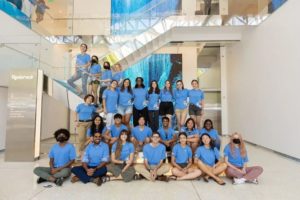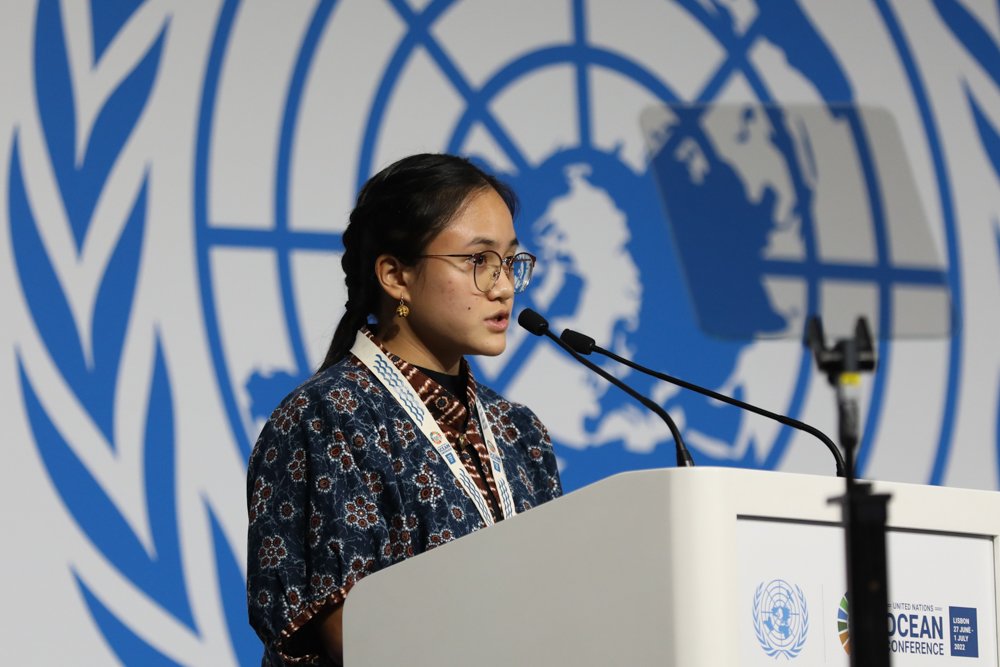Brigitta Maria Andrea Gunawan is a member of EarthEcho International’s Youth Leadership Council, representing a global network of young ocean advocates driving efforts to protect and restore our ocean planet. She spoke at the plenary hall of the United Nations Ocean Conference in Lisbon, Portugal, addressing member states and distinguished delegates from across the globe after being introduced by the President of Portugal, with the President of France taking the same podium moments after. She also also spoke in two side events during this conference, speaking to the power of youth engagement and intergenerational collaboration.
Brigitta is the founder of 30×30 Indonesia – a movement aiming to educate and mobilize public support towards protecting 30% of the world’s ocean by 2030 – utilizing education to address marine issues, restore habitats, and inspire action, which has reached over 10,000 people and garnered the attention of Bali’s Provincial Government’s Marine and Fisheries Service. She was the youngest member of the IUCN World Commission on Protected Areas who received full sponsorship to attend the Asia Parks Congress in Sabah, Malaysia as a young professional speaking at the Youth Forum.
We recently spoke to Brigitta about her mission to conserve the local and global Ocean at such a young age.
You’re a prominent Youth voice in the world of marine policy, but you’re also a professional swimmer – what influence has spending time in water had on you?
There’s no doubt that being a competitive swimmer has shaped me into the person I am today. Having spent countless hours in the water ever since I was a toddler taking my first baby steps on the shores of Bali, to growing up in the world of competitive swimming, I do believe the water has influenced the ways I strive towards my goals. Whether it be the mindset and whole-hearted commitment in being laser-focused towards a specific target, or the appreciation towards a hard-fought journey – being in and around the water has certainly shown me that there is a world beyond the ground we stand on.
The experience of being in a body of water – a force so powerful yet so calm – is simply irreplaceable. Swimming certainly opens new perspectives on the marine environment as a whole, giving us a glimpse of life below water. From a swimmer’s point of view, there is always something you can do everyday to get where you want to be. Similarly, there is a lot we can change in our daily habits as we fight to restore our ocean, knowing that we have so heavily exploited nature’s gift to humanity – water.
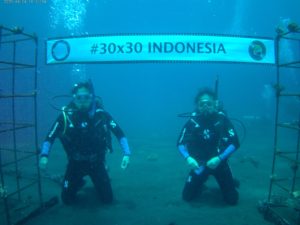
What impact has your Indonesian heritage had on the work you are doing for the Ocean and the environment?
Coming from the world’s largest archipelago, overflowing with biodiversity and home to a large portion of the Coral Triangle, has certainly impacted my work for the ocean and the environment. More than anything, my Indonesian heritage has been a source of motivation that drives my efforts to protect and restore our ocean planet. Being a country that is heavily dependent on the ocean and its resources, home to many coastal communities that depend on the ocean as a source of livelihood, I have recognized the need for any efforts that take action for the ocean.
What barriers or challenges do you think young people, women or Indonesians face when trying to carve out a career path?
Like many other parts of the world, I think that age, gender, and other intersecting identities as a whole, to an extent, determines our experiences in carving a career path. Unfortunately, it may be even more difficult when one possesses multiple identities, for example being a young woman from a developing nation. There is always a degree of prejudice on these occasions – people may overlook your capabilities because you are young, lack qualifications, or simply because you do not have access to certain resources. These would then create barriers between where you are now and where you aspire to be, which can often be something that causes many people to refrain from pursuing their dream careers. Though there is an endless list of barriers, these challenges most certainly include the lack of opportunities in pursuing such careers due to these intersecting identities.
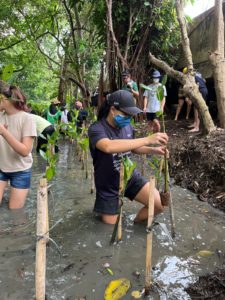
Did you take a traditional, educational route (ie. school, university) towards your role now and what has been the most transformative part of your journey? Have you had any inspiring mentors?
Though I am still currently in high school, I would not necessarily classify my role now as a traditional route. Being the founder of 30×30 Indonesia – a movement that has reached over 10,000 people throughout Southeast Asia in the past year – I initiated this movement as part of a 3-month fellowship with EarthEcho International, and continued developing events through other opportunities with National Geographic Society, The Nature Conservancy, and Paragon One. Prior to this, I was active in voluntary positions like leading my school’s first ocean conservation club, to being a translator for Bye Bye Plastic Bags. Now a member of the IUCN World Commission on Protected Areas, and a Youth Leadership Council Member at EarthEcho International, I do believe that the multiple organizational experiences and achievements I collected thus far have helped me obtain my role now.
The most transformative part of my journey would be the recent opportunities to travel the world to attend conferences such as the United Nations Ocean Conference in Lisbon, the Asia Parks Congress in Malaysia, and the Youth Leadership Council meeting in Washington, D.C. These in-person conferences have enhanced my knowledge in this field, allowing me to meet so many inspiring experts, and ultimately helping me plan for future steps.
I have had the pleasure of learning from so many incredible mentors like my current biology teacher who has provided endless support for me to dive into the ocean conservation space, and other inspiring experts in this field who have shown me what is truly possible with passion.
Can you tell us about some other events you have attended this year?
I have had the pleasure of representing youth voices in multiple conferences this year. I attended the Asia Parks Congress in Sabah, Malaysia as a young professional who spoke at the Youth Forum, sharing about 30×30 Indonesia and the importance of youth in this space. A month later, I had the incredible experience of speaking at the plenary session of the United Nations Ocean Conference in Lisbon, Portugal, introduced by the President of Portugal, while the President of France took the same podium moments after. During this conference, I also spoke in two other sessions to emphasize youth engagement and to address the Blue Park Award winners. More recently, I attended the Youth Leadership Council meeting in Washington, D.C. to convene with other youth leaders on ocean climate action.
You have mobilized many campaigns – from the 30% marine protection by 2030, to banning plastic bags, what has been your biggest win so far?
I think my biggest win so far is being able to advocate for the protection of 30% of the world’s ocean by 2030 at the United Nations Ocean Conference plenary hall, in a crowd of Presidents, member states, and distinguished delegates from across the globe. It has been a pleasure to be a voice for the global youth who recognizes the need to implement ocean climate action in order for us to have a future.
Do you have any advice for emerging Early Career Professionals on how to make a difference in their community and beyond?
Recognize your passion, keep it in focus, hold on to it, and never let it go. Though I am still continuously learning to make a difference, I believe that passion is a fuel for a durable ocean conservation movement and any emerging Early Career Professionals who strive for a better world.
What opportunities do you see for individuals, young people and Early Career Ocean Professionals to get involved with the Decade of Ocean Science?
There are lots of opportunities for Early Career Ocean Professionals, especially young people, in this Decade of Ocean Science. As the ocean is increasingly gaining the attention it deserves as a climate solution, there are more opportunities for everyone to get involved. Now, more than ever, we need young people to step up and lead the change we want to see.
How do you think we can achieve the science we need for the Ocean we want?
I believe intergenerational collaboration is key to meaningfully integrating science in ocean solutions. When we take our first steps of action and unite in creating innovative solutions, we create a wave of change that will significantly bolster the support we need for the ocean we want.
Thanks to Brigitta for being featured in this interview. Follow the links for more information on her work with 30×30 Indonesia and to get involved with Earth Echo International (see the Youth Leadership Council below).
